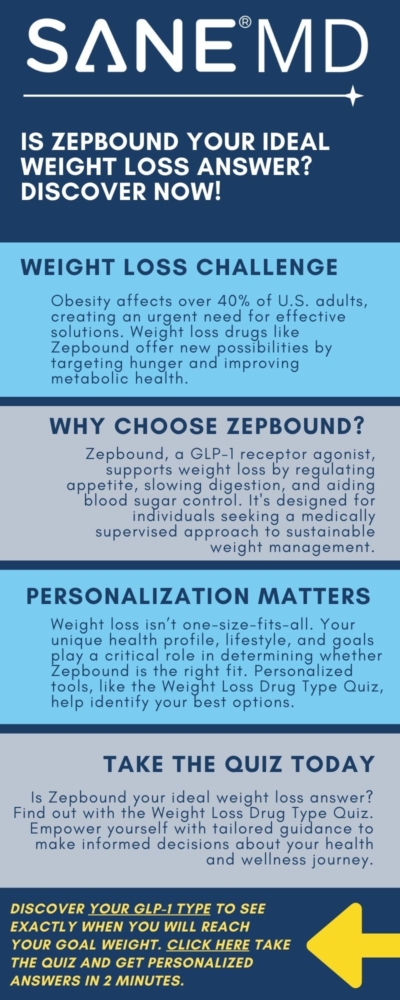Is Zepbound Your Ideal Weight Loss Answer? Take the Quiz
Dr. Matthew Olesiak, MD, is the Chief Medical Director at SANESolution, a renowned wellness technology company dedicated to providing evidence-based solutions for optimal living. Dr. Olesiak earned his medical degree from the prestigious Jagiellonian University Medical College in Kraków, Poland, where he developed a strong foundation in medicine.
In recent years, weight loss drugs have emerged as an essential tool for managing obesity and its associated health risks. With more than 40% of adults in the U.S. classified as obese, finding effective solutions has become a priority for both individuals and healthcare providers. Among the options available, Zepbound, a new weight loss drug and injectable medication in the GLP-1 receptor agonist class, has gained attention for its potential to aid in weight loss while supporting overall metabolic health. But is Zepbound your ideal weight loss answer?
Determining whether Zepbound is your ideal weight loss answer requires a closer look at how it fits into your unique health journey. Weight loss success often hinges on a tailored approach, taking into account personal factors like lifestyle, medical history, and individual goals.
However, weight loss isn’t a one-size-fits-all journey. What works for one person may not be suitable for another due to differences in lifestyle, medical history, and individual goals. That’s why it’s important to approach weight loss with a personalized mindset.
To help you figure out if Zepbound for weight loss aligns with your unique needs, we’ve introduced the Weight Loss Drug Type Quiz. This quick, easy-to-take quiz provides tailored guidance, helping you decide if Zepbound might be the right option for your weight loss journey.
Let’s dive in and explore whether Zepbound could be your ideal solution for achieving sustainable weight loss.
Key Takeaways
- Personalization matters: Not all weight loss drugs are suitable for everyone.
- Zepbound’s benefits: A new option for weight loss management with a focus on sustainability.
- Take the quiz: Discover if Zepbound is your ideal match for achieving your goals.
What Is Zepbound?
Zepbound is a prescription medication classified as a GLP-1 receptor agonist or glucose-dependent insulinotropic polypeptide, a type of drug designed to support weight loss by mimicking the hormone glucagon-like peptide-1. This hormone plays a crucial role in regulating appetite, insulin production, and blood sugar levels. GLP-1 drugs like Zepbound have gained popularity for their effectiveness in promoting weight loss and improving overall metabolic health.
By targeting hunger signals in the brain and slowing gastric emptying, Zepbound helps users feel full longer and consume fewer calories. Additionally, it can improve glucose control, making it particularly beneficial for individuals with conditions like Type 2 diabetes.
The benefits of Zepbound extend beyond weight loss. It may also help lower blood sugar levels, reduce the risk of heart disease, and promote better energy regulation. These secondary health benefits make Zepbound an appealing choice for people looking to improve their overall health while managing their weight.
However, Zepbound isn’t right for everyone. Factors like medical history, current health conditions, and individual goals play a role in determining its suitability. That’s why personalization is key when choosing a weight loss drug.
The Weight Loss Drug Type Quiz is a quick and effective tool to help identify if Zepbound aligns with your health and lifestyle goals.
How Does Zepbound Compare to Other Weight Loss Drugs?
When considering weight loss medications, it’s helpful to compare Zepbound to other well-known options such as Wegovy, Saxenda, and Ozempic. All of these drugs belong to the GLP-1 receptor agonist class, meaning they share a similar mechanism of action: regulating appetite and improving blood sugar control.
However, there are key differences. For instance, Zepbound offers a unique dosing schedule that may suit individuals looking for less frequent injections compared to Saxenda. In contrast, Wegovy and Ozempic may offer specific advantages in terms of long-term weight loss outcomes, depending on individual responses.
Side effects also vary. While nausea and gastrointestinal issues are common across GLP-1 drugs, some users report differences in severity based on the medication. Common side effects include injection site reactions. Serious side effects can include serious allergic reactions. Cost and insurance coverage are additional factors that might influence your decision. For example, Zepbound may be more affordable for some, while others might find Wegovy or Ozempic better covered by their insurance plans.
Ultimately, the best choice depends on your unique health profile and lifestyle preferences.
Is Zepbound your ideal weight loss answer?
Take the Weight Loss Drug Type Quiz to see if it might fit your weight loss goals. This personalized tool can help you make a more informed decision.
Who Might Benefit from Zepbound?
Zepbound is designed for individuals who meet specific eligibility criteria, making it a targeted option for weight management. Generally, it is recommended for:
- Adults with a BMI of 30 or higher (classified as obese).
- Adults with a BMI of 27 or higher who also have weight-related health conditions, such as Type 2 diabetes, high blood pressure, or sleep apnea.
This obesity medication is particularly suitable for individuals seeking a medically supervised weight loss program. Since Zepbound requires regular injections and ongoing monitoring, it’s most effective when combined with lifestyle changes and support from healthcare professionals.
However, there are situations where Zepbound may not be a suitable option. It is contraindicated for individuals with certain medical conditions, such as a personal or family history of medullary thyroid cancer or multiple endocrine neoplasia syndrome type 2. Pregnant or breastfeeding individuals should also avoid Zepbound, as its safety has not been established for these groups. Zepbound can also affect the efficacy of birth control pills.
Since weight loss is a highly individualized journey, choosing the right medication involves considering factors like medical history, lifestyle, and personal goals.
Pros and Cons of Zepbound
Like any weight loss drug, Zepbound comes with advantages and disadvantages.
Pros:
- Effective for long-term weight management: Zepbound helps reduce appetite and promotes sustainable weight loss.
- Potential benefits beyond weight loss: Many users experience improved blood sugar levels, reduced risk of cardiovascular disease, and better overall metabolic health.
- Minimal invasiveness compared to bariatric surgery: Zepbound provides a non-surgical alternative for individuals looking to manage their weight medically.
Cons:
- Possible side effects: Common side effects include nausea, vomiting, diarrhea, and constipation. These symptoms typically lessen over time but can be severe for some individuals. To learn more, see our complete guide to Zepbound side effects.
- Cost considerations: Without insurance coverage, Zepbound can be expensive, and coverage varies depending on your provider.
- Requires commitment: Regular injections and follow-up appointments may not suit everyone’s lifestyle.
Pros and Cons of Zepbound
| Pros | Cons |
|---|---|
| Effective for long-term weight management | Possible side effects include nausea, diarrhea, and decreased appetite |
| May improve blood sugar levels and metabolic health | Cost considerations and limited insurance coverage |
| Non-invasive compared to bariatric surgery | Requires regular injections and ongoing medical supervision |
| Supports sustainable weight loss through appetite regulation | Not suitable for everyone (e.g., pregnant individuals, those with certain health conditions) |
No single weight loss medication is a “one-size-fits-all” solution. Choosing the right drug involves weighing the pros and cons while considering your specific needs.
Take the Quiz: Is Zepbound Your Ideal Weight Loss Answer?
If you’re wondering whether Zepbound is the right weight loss solution for you, the Weight Loss Drug Type Quiz is here to help. This simple, quick, and personalized tool is designed to evaluate your unique profile, making it easier to determine if Zepbound aligns with your weight loss goals.
Remember, the results are not a substitute for medical advice but can serve as a valuable starting point for a discussion with your healthcare provider. Whether you’re just beginning to explore your options or seeking clarity about the next step, taking the quiz is an empowering way to take control of your weight loss journey.
Take the quiz today and discover if Zepbound could be your ideal weight loss answer!
FAQs About Zepbound
Choosing a weight loss drug like Zepbound can feel overwhelming, especially with so many factors to consider. To help you make an informed decision, we’ve compiled answers to some of the most frequently asked questions about Zepbound. From understanding how the medication works to determining if it’s the right fit for your needs, this section provides clarity and guidance for your weight loss journey.
1. Is Zepbound approved for weight loss?
Zepbound is FDA-approved for weight loss in individuals who meet specific criteria, such as a BMI (body mass index) of 30 or higher or a BMI of 27 with weight-related health conditions. Always consult a healthcare provider to confirm eligibility.
2. Can you lose weight on Zepbound without dieting?
While Zepbound supports appetite regulation and calorie control, combining it with a healthy reduced calorie diet and regular exercise typically leads to better results. The quiz can help identify if this aligns with your lifestyle.
3. Is Zepbound worth it?
Zepbound’s value depends on your weight loss goals, medical conditions, and budget. Many users find it effective for sustained weight loss, but individual results vary. Taking the quiz can help determine if Zepbound is the right fit for you.
4. How much weight can you lose on Zepbound in 1 month?
Weight loss varies depending on factors like diet, exercise, and metabolism. Clinical trials show an average weight loss of 3-5% of initial body weight within the first few months, but individual results may differ.
5. Are there side effects I should be concerned about?
Common side effects of Zepbound include nausea, diarrhea, and decreased appetite. Serious side effects are rare but should be discussed with your doctor.
6. How does Zepbound compare to Wegovy or Ozempic?
While all three drugs belong to the GLP-1 receptor agonist class, their formulations, dosages, and effects may differ. Zepbound may be more suitable for some individuals in shedding excess weight, depending on their health profile.
Conclusion: Making an Informed Choice for Your Weight Loss Journey
Finding a personalized approach to weight loss is essential, as no single solution works for everyone. Zepbound offers promising benefits, including appetite regulation, weight management, and improved metabolic health. However, it’s important to remember that this medication may not be suitable for everyone due to individual health conditions, contraindications, and lifestyle considerations.
Taking the time to explore your options can lead to better results and a safer, more sustainable weight loss journey. The Weight Loss Drug Type Quiz is a valuable tool to help you determine if Zepbound or another weight loss medication aligns with your needs and goals.
Empower yourself by taking charge of your health journey today. Whether Zepbound is the right fit or another path proves more suitable, making informed decisions puts you one step closer to achieving your weight loss and wellness goals.





